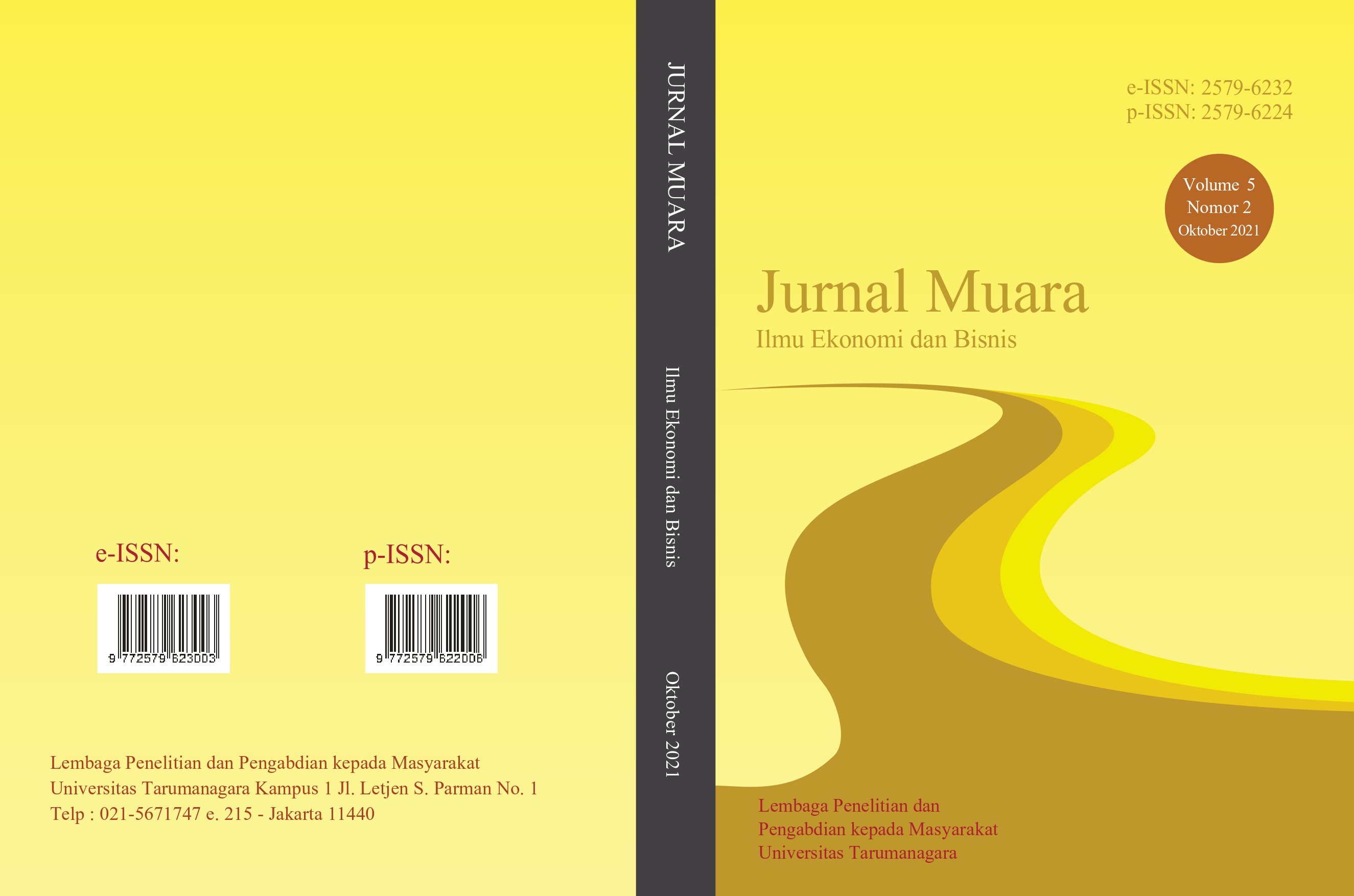PENGUJIAN FAKTOR-FAKTOR YANG MEMBENTUK NIAT PEMBELIAN KONSUMEN SALADSTOP
Main Article Content
Abstract
Tujuan dari penelitian ini adalah untuk menguji pengaruh penggunaan media sosial oleh konsumen, komunikasi oleh perusahaan, dan komunikasi oleh pengguna terhadap loyalitas dan kepercayaan. Selain itu, penelitian ini juga menguji pengaruh loyalitas dan kepercayaan terhadap niat pembelian, serta menguji adanya peran moderasi gender dalam pembentukan niat pembelian. Responden dalam penelitian ini adalah pelanggan SALADSTOP! di Jakarta dan orang-orang yang menggunakan media sosial. Metode convenience sampling digunakan dengan menyebarkan kuesioner online kemudian diolah menggunakan SmartPLS-SEM. Hasil dari penelitian ini adalah penggunaan media sosial dari konsumen, komunikasi oleh perusahaan, komunikasi oleh pengguna, loyalitas, dan kepercayaan, dapat mempengaruhi niat pembelian. Namun penggunaan media sosial dari konsumen tidak dapat mempengaruhi loyalitas. Gender juga tidak berpengaruh untuk mendukung atau memoderasi loyalitas terhadap niat pembelian dan juga kepercayaan terhadap niat pembelian.
The purpose of this study is to test the effect of consumer used of social media, company-generated communication, and user-generated communication to loyalty and trust, then loyalty and trust to purchase intention, and also to test gender as moderation between loyalty to purchase intention and trust to purchase intention. The population of this research is SALADSTOP! customers in Jakarta and people who use social media. The convenience sampling method is used by distributing online questionnaires and then processed using SmartPLS-SEM. The results of this study are consumer used of social media, company-generated communication, user-generated communication, loyalty, and trust, can affect purchase intention. But consumer used of social media cannot affect loyalty. Gender also didn’t have any affect to support or moderating loyalty to purchase intention and trust to purchase intention.
Article Details
References
Alfian, C. & Sihombing, S.O. (2021). Anteseden loyalitas merek: Studi empiris pada konsumen Starbucks. Jurnal Muara Ilmu Ekonomi dan Bisnis, 5 (1): hlm 99-110. https://10.24912/jmieb.v5i1.10056.
Becerra, E.P., & Badrinarayanan, V. (2013). The influence of brand trust and brand identification on brand evangelism. Journal of Product & Brand Management, 22(5/6), 371-383. https://doi.org/10.1108/jpbm-09-2013-0394
Benson, V., Ezingeard, J., & Hand, C. (2019). An empirical study of purchase behaviour on social platforms. Information Technology & People, 32(4), 876-896. https://doi.org/10.1108/itp-08-2017-0267
Chakraborty, D. (2019). Factors responsible for making young urban consumers brand loyal: A study on mobile network operators. Journal of Management Development, 38(7), 616-636. https://doi.org/10.1108/JMD-01-2019-0029
Ebrahim, R. S. (2019). The role of trust in understanding the impact of social media marketing on brand equity and brand loyalty. Journal of Relationship Marketing, 19(4), 287-308. https://doi.org/10.1080/15332667.2019.1705742
Esenyel, I., & Girgen, M. (2019). Customer interactions on social media and their impact on trust and loyalty: The moderating role of product learning. Management Science Letters, 1497-1506. https://doi.org/10.5267/j.msl.2019.5.003
Hameed, S., & Kanwal, M. (2018). Effect of brand loyalty on purchase intention in cosmetics industry. Research in Business and Management, 5(1), 25. https://doi.org/10.5296/rbm.v5i1.12704
Tunjungsari, H.K. (2019). Pengaruh Kemasan Terhadap Minat Beli Masyarakat Dengan Kualitas Sebagai Variabel Mediasi Pada Produk “Legit”. Jurnal Manajemen Bisnis dan Kewirausahaan, 2(6). https://doi.org/10.24912/jmbk.v2i6.4908
Irshad, M., Ahmad, M. S., & Malik, O. F. (2020). Understanding consumers’ trust in social media marketing environment. International Journal of Retail & Distribution Management, 48(11), 1195-1212. https://doi.org/10.1108/ijrdm-07-2019-0225
Issock Issock, P. B., Roberts-Lombard, M., & Mpinganjira, M. (2020). The importance of customer trust for social marketing interventions: A case of energy-efficiency consumption. Journal of Social Marketing, 10(2), 265-286. https://doi.org/10.1108/jsocm-05-2019-0071
Jeon, M. M., & Jeong, M. (2017). Customers’ perceived website service quality and its effects on E-loyalty. International Journal of Contemporary Hospitality Management, 29(1), 438-457. https://doi.org/10.1108/ijchm-02-2015-0054
Kwon, J., Jung, S., Choi, H., & Kim, J. (2020). Antecedent factors that affect restaurant brand trust and brand loyalty: Focusing on US and Korean consumers. Journal of Product & Brand Management, ahead-of-print(ahead-of-print). https://doi.org/10.1108/jpbm-02-2020-2763
Mainardes, E. W., & Cardoso, M. V. (2019). Effect of the use of social media in trust, loyalty and purchase intention in physical stores. The International Review of Retail, Distribution and Consumer Research, 29(4), 456-477. https://doi.org/10.1080/09593969.2019.1583593
Nyadzayo, M. W., Johnson, L. W., & Rossi, M. (2020). Drivers and outcomes of brand engagement in self-concept for luxury fashion brands. Journal of Fashion Marketing and Management: An International Journal, 24(4), 589-609. https://doi.org/10.1108/jfmm-05-2018-0070
Oliver, R. L. (1999). Whence consumer loyalty? Journal of Marketing, 63, 33-44. https://doi.org/10.1177/00222429990634s105
Palmatier, R. W., L. K. Scheer, and J.-B. E. M. Steenkamp. 2007. “Customer Loyalty to Whom? Managing the Bene?ts and Risks of Salesperson-Owned Loyalty.” Journal of Marketing Research 44 (2): 185–199. doi:10.1509/jmkr.44.2.185.
Panda, T. K., Kumar, A., Jakhar, S., Luthra, S., Garza-Reyes, J. A., Kazancoglu, I., & Nayak, S. S. (2020). Social and environmental sustainability model on consumers’ altruism, green purchase intention, green brand loyalty and evangelism. Journal of Cleaner Production, 243, 118575. https://doi.org/10.1016/j.jclepro.2019.118575
Poulis, A., Rizomyliotis, I., & Konstantoulaki, K. (2018). Do firms still need to be social? Firm generated content in social media. Information Technology & People.
Rapp, A., L. S. Beitelspacher, D. Grewal, and D. E. Hughes. 2013. “Understanding Social Media E?ects across Seller, Retailer, and Consumer Interactions.” Journal of the Academy of Marketing Science 41 (5): 547–566. doi:10.1007/s11747-013-0326-9.
Schivinski, B., and D. Dabrowski. 2015. “The Impact of Brand Communication on Brand Equity through Facebook.” Journal of Research in Interactive Marketing 9 (1): 31–53. doi:10.1108/JRIM02-2014-0007.
Sohail, M. S., Hasan, M., & Sohail, A. F. (2020). The impact of social media marketing on brand trust and brand loyalty. International Journal of Online Marketing, 10(1), 15-31. https://doi.org/10.4018/ijom.2020010102
Srivastava, S. C., S. Chandra, and Y. L. Theng. 2010. “Evaluating the Role of Trust in Consumer Adoption of Mobile Payment Systems: An Empirical Analysis.” Communications of the Association for Information Systems 27: 561–588.
Thakur, R. (2016). Understanding customer engagement and loyalty: A case of mobile devices for shopping. Journal of Retailing and Consumer Services, 32, 151-163. https://doi.org/10.1016/j.jretconser.2016.06.004
Zhang, C., & Li, Y. (2019). How social media usage influences B2B customer loyalty: Roles of trust and purchase risk. Journal of Business & Industrial Marketing, 34(7), 1420-1433. https://doi.org/10.1108/jbim-07-2018-0211





